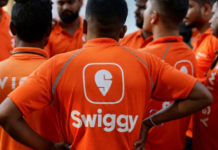
In a major development in the Indian rural fintech space, SarvaGram, a credit startup focused on rural households, has successfully raised Rs 565 crore (approximately $67 million) in its Series D funding round. This round was led by Peak XV Partners, formerly known as Sequoia India & Southeast Asia, and also saw significant participation from existing investors like Elevation Capital, Elevar Equity, Temasek, and TVS Capital. This funding boost is expected to help the company scale its operations and expand its reach to more villages across India.
According to regulatory filings analyzed by startup news platform Entrackr, SarvaGram’s board approved the allotment of 21,857 Series D compulsorily convertible preference shares (CCPS) and 20 equity shares in November 2023. Each share was priced at Rs 2,51,431.22, bringing the total funding to Rs 550 crore. An earlier allotment of Rs 15 crore added to this, resulting in a combined fundraise of Rs 565 crore. This capital infusion is one of the largest in India’s rural fintech sector in recent times.
Investors Backing SarvaGram’s Rural Mission
Peak XV Partners led the round with a massive Rs 340 crore investment, followed by Elevation Capital, which contributed Rs 80.76 crore. Elevar Equity added Rs 68 crore, while Temasek and TVS Capital pitched in with Rs 45.48 crore and Rs 30.78 crore respectively. This strong lineup of institutional investors is a clear indication of the rising interest in rural credit models and the untapped potential in India’s villages.
The funding round not only brings in money but also strategic backing. With Peak XV’s vast experience in scaling startups and Elevar Equity’s long-term focus on impact investing, SarvaGram stands to gain critical guidance for its next phase of growth.
Valuation Doubles as SarvaGram Strengthens Market Position
This funding round has helped double SarvaGram’s valuation to Rs 1,785 crore (around $212 million), compared to its previous valuation of Rs 790 crore ($94 million) during its Series C round in 2022 when it raised $35 million. This 2X jump in valuation shows how the company’s business model, revenue performance, and market expansion strategy have impressed investors.
According to startup data tracker TheKredible, SarvaGram has now raised over $116 million in total across various rounds. With this latest investment, Elevar Equity emerges as the largest external shareholder with a 23.78% stake, while Peak XV Partners and Elevation Capital hold 19.05% and 18.40%, respectively. The startup’s co-founders, Utpal Isser and Sameer Mishra, continue to hold 11% and 7.05% stakes in the company, maintaining significant control and leadership.
SarvaGram’s Business Model: More Than Just Credit
Launched in 2019, SarvaGram is on a mission to bring modern financial services to rural households across India. The startup provides a wide range of credit products including business loans, farm loans, personal loans, home loans, and gold loans. But SarvaGram goes beyond just lending. It also offers insurance products and farm mechanization services, enabling rural families to access high-quality farming equipment like cultivators, rotavators, and harvesters at affordable prices.
One of the key innovations of SarvaGram is its SarvaMitra network, which includes trained franchise partners who act as the company’s local representatives in villages. These SarvaMitras help deliver financial services in person, build trust with customers, and ensure last-mile connectivity in some of the most remote parts of the country.
Strong Rural Reach and Growing Customer Base
SarvaGram’s on-ground presence is one of its biggest strengths. According to information available on its website, the company has already served over 1.5 lakh rural households. It has also partnered with 170+ shops and built a growing network of 630+ SarvaMitra franchises. With operations covering more than 38,000 villages, SarvaGram is creating a truly pan-India rural financial network.
This wide reach is helping the company collect better data, offer customized credit products, and build long-term relationships with its users. By integrating local knowledge with tech-enabled services, SarvaGram is fast becoming a household name in many rural areas.
Financial Performance: Growth with Control
SarvaGram has also shown strong financial growth in the past year. For the financial year ending March 2024, the company reported a 2.3X increase in operating revenue, reaching Rs 170 crore. At the same time, it has managed to reduce its losses by 30%, bringing the figure down to Rs 19.75 crore. This balance of revenue growth and cost control is a positive sign for investors and indicates that the business is on a sustainable path.
Unlike many early-stage startups that rely heavily on burning cash, SarvaGram appears to be building a solid foundation with disciplined financial practices and a clear roadmap for profitability.
The Growing Opportunity in Rural Fintech
The Indian rural market is emerging as the next big frontier for fintech. With growing digital literacy, increased smartphone penetration, and a greater need for customized financial products, rural India offers vast opportunities. However, these regions remain underserved by traditional banks and NBFCs due to operational challenges and high servicing costs.
SarvaGram’s model is tailored to meet these challenges. By blending technology, data-driven credit evaluation, and local partnerships, the company is addressing the unique needs of rural customers. This makes SarvaGram more than just a lender—it’s a rural empowerment platform.
Competition and Industry Landscape
SarvaGram is part of a competitive but exciting space. It competes with players like Jai Kisan, which raised $50 million in a Series B round in 2022, and Arya.ag, which raised $30 million in debt in January 2024. Other notable startups in the rural and agri-fintech segment include Samunnati, AgriBazaar, and DeHaat.
While competition is heating up, SarvaGram’s hybrid model of combining financial services with local engagement gives it a unique edge. The franchise-led distribution system, in particular, is helping it scale faster while building trust at the village level.
What Lies Ahead for SarvaGram?
With fresh capital in the bank, SarvaGram is expected to expand its geographic footprint, launch new products, and strengthen its tech infrastructure. It may also venture into digital savings, mobile banking services, or integrated agri-finance offerings in the future. The company is likely to invest more in hiring, training, and enhancing its AI-powered credit models for better customer targeting.
As India moves towards becoming a digitally inclusive economy, SarvaGram is playing a key role in ensuring that rural citizens are not left behind. With continued investor support and a clear vision, the startup is well on its way to becoming a leader in financial inclusion.
The Rs 565 crore Series D funding marks a significant leap forward for SarvaGram. With its valuation doubling and backing from top-tier investors, the company is now better positioned to fulfill its mission of transforming rural India’s financial landscape. Its innovative approach, strong franchise network, and commitment to underserved communities make it a standout player in the rural fintech sector.
As more Indians from rural areas seek access to credit, insurance, and financial tools, startups like SarvaGram will be critical in building a more inclusive and empowered India.


































